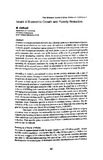| dc.contributor.author | Rathedi, M. | |
| dc.date.accessioned | 2011-09-15T09:51:58Z | |
| dc.date.available | 2011-09-15T09:51:58Z | |
| dc.date.issued | 2003 | |
| dc.identifier.citation | Rathedi, M. (2003), Issues of economic growth and poverty reduction, Pula: Botswana Journal of African Studies, Vol. 17, No. 2, pp. 85-92 | en_US |
| dc.identifier.uri | http://hdl.handle.net/10311/883 | |
| dc.description.abstract | Poverty is a complex problem and reducing it depends upon many interconnected factors. It cannot be attributed to one main cause. Its reduction is possible only by achieving economic growth. An indirect causal connection between growth and poverty reduction
can be seen because governments will have greater scope for action through suitable policy measures that can take care of the interests of the poor. In spite of the efforts of most of the developing countries, where the levels of poverty are high, to reduce the
magnitude of poverty, the percentage of people living below the poverty level has not been reduced significantly. Of course, international financial institutions have been extending the necessary assistance by setting the goals. But poverty reduction lies in
the nature of the growth process itself, as determined by the set of economic policies that are being pursued by governments to justify actions targeted towards the poor. | en_US |
| dc.language.iso | en | en_US |
| dc.publisher | Pula: Botswana Journal of African Studies, www.thuto.org/pula/html/ | en_US |
| dc.subject | Poverty reduction | en_US |
| dc.subject | Economic growth | en_US |
| dc.subject.lcsh | Poverty reduction | en_US |
| dc.subject.lcsh | Economic growth | en_US |
| dc.title | Issues of economic growth and poverty reduction | en_US |
| dc.type | Published Article | en_US |
| dc.link | http://archive.lib.msu.edu/DMC/African%20Journals/pdfs/PULA/pula017002/pula017002012.pdf | en_US |

